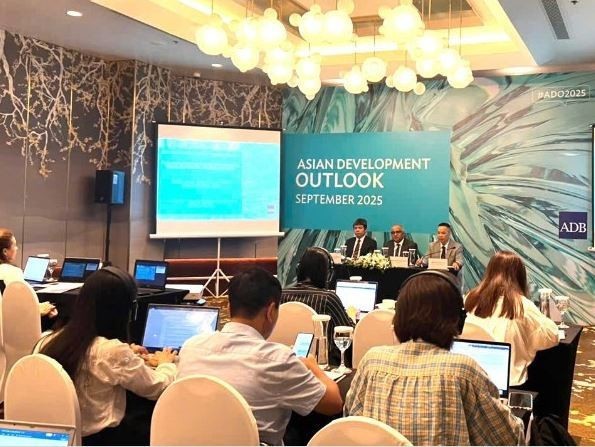ADB Raises Vietnam's Economic Growth Forecast This Year To 6.7%
| Deputy Foreign Minister Visits, Gives Gifts to Vietnamese Community in Japan’s Kyushu | |
| Chinese Expert Hails Vietnamese Economic and Diplomatic Development Achievements in 2024 |
On October 30, the Asian Development Bank (ADB) released its September 2025 Asian Development Outlook, revising Vietnam’s economic growth forecast for 2025 up to 6.7% (from 6.6% in the April projection) while lowering the 2026 forecast to 6.0% (from 6.5% in April). The revisions reflect shifts in the global environment as well as domestic economic factors.
Bright spots in services and agriculture
According to ADB experts, despite significant global headwinds, Vietnam’s economy maintained an encouraging pace of growth in the first half of 2025. GDP expanded by 7.5% during the period, the highest first-half growth rate since 2010. Industry and construction posted robust growth of 8.3%, up from 7.5% in the same period last year, largely driven by a rebound in manufacturing and major infrastructure projects.
 |
| The overview of the meeting (Photo: Vietnam Plus) |
In particular, Vietnam’s industrial output is projected to grow by 7.7% in 2025, supported by rising exports of manufactured goods, a key driver of economic expansion. Foreign direct investment (FDI) has also remained steady, reaching USD 15.4 billion in the first eight months of 2025, the highest disbursement level in five years. FDI continues to play a vital role in the development of industry and in enhancing the competitiveness of domestic enterprises.
While industries are growing strongly, services are also continuing to maintain growth momentum with a forecast of 7.4% in 2025. The finance-banking, logistics, transportation, communications, retail, and tourism sectors all contribute positively to the overall growth of the economy. In particular, tourism and related industries are having a strong recovery after the pandemic, leading to increased consumer demand.
Although agriculture is expected to expand at a more modest pace, the sector is projected to grow by 3.4% in 2025, supported by rising global demand for high-quality, sustainable food. Smart farming technologies and measures to improve production efficiency are also contributing to higher productivity and added value in the sector.
Focus on fiscal and monetary policy
The ADB report also noted that while growth in Vietnam’s key sectors has been highly positive, the economy still faces several risks stemming from the global environment and trade policies.
 |
| According to ADB experts, despite significant global headwinds, Vietnam’s economy maintained an encouraging pace of growth in the first half of 2025. (Photo: Vietnam Plus) |
One direct factor is the tariff regime imposed by the United States on Vietnamese goods, specifically, a 20% tariff on imports and 40% on transshipments. This could hurt Vietnam’s exporters, particularly in the short term, as global supply chains continue to face significant disruptions.
However, according to Shantanu Chakraborty, ADB Country Director for Vietnam, the upward revision of Vietnam’s GDP growth forecast to 6.7% in 2025, supported by resilient domestic demand and economic stimulus policies, is a positive sign.
The ADB also forecasts that inflation in Vietnam will remain relatively low, at 3.9% in 2025 and 3.8% in 2026, though some pressure is expected from tariff policies and exchange rate volatility.
One of the key factors supporting Vietnam’s growth momentum is its expansionary fiscal and monetary policies.
According to Nguyen Ba Hung, Principal Country Economist at ADB Vietnam, said that economic stimulus policies will help mitigate the impact of external factors. In this context, effective fiscal policy will continue to be the key factor to maintain growth in the period 2025-2026.
Keeping public debt below 34% of GDP, well under the statutory ceiling of 60%, provides Vietnam with ample fiscal space to implement growth-stimulus measures, particularly in areas such as public investment and social spending for low-income households. Effective public investment, in turn, will help address infrastructure bottlenecks and support sustainable economic development.
 |
| Nguyen Ba Hung, Principal Country Economist at ADB Vietnam (Photo: Vietnam Plus) |
The Vietnamese government could also consider targeted tax cuts, reducing compliance costs for businesses, and pursuing institutional reforms to improve disbursement efficiency. Deeper reforms in the legal and regulatory environment would not only strengthen Vietnam’s capacity to attract investment but also enhance competitiveness and innovation in the private sector.
One key lesson highlighted by the ADB is that Vietnam needs to shift its economic structure toward a more balanced growth model, reducing reliance on exports and foreign investment. With domestic firms accounting for only around 25% - 30% of total export turnover, greater efforts are required to strengthen the private sector and improve the competitiveness of local enterprises.
Nguyen Ba Hung emphasized that science, technology, and innovation will be decisive in strengthening the competitiveness of Vietnamese enterprises in the future. To achieve this goal, Vietnam will need stronger policy support to develop key industries, promote investment in research and development, and accelerate technology transfer.
According to ADB experts, Vietnam’s economic outlook for 2025–2026 remains broadly positive, though external risks persist, particularly from tariff policies and volatility in international markets.
To maintain sustainable growth, Vietnam needs to focus on institutional reform, enhancing private sector competitiveness, and boosting public investment in infrastructure. A more balanced growth model, with stronger contributions from the domestic sector, would help Vietnam mitigate risks from external shocks and lay the foundation for a resilient and sustainable economy in the future.
 | ADB: Vietnam's Economy Remains Resilient Amidst Global Uncertainty The Asian Development Bank (ADB) has projected a robust economic outlook for Vietnam, with GDP growth expected to reach 6% in 2024 and 6.2% in ... |
 | Vietnam's Economic Outlook: Global Optimism for Sustained Growth Vietnam's robust economy has earned the continued confidence of international organizations. |







